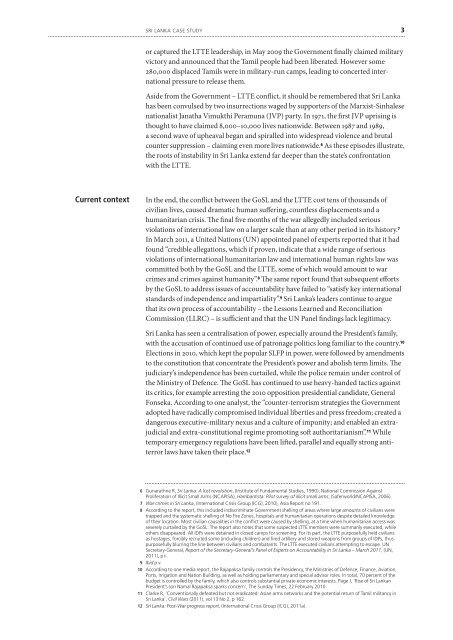FAB Sri Lanka
FAB Sri Lanka
FAB Sri Lanka
You also want an ePaper? Increase the reach of your titles
YUMPU automatically turns print PDFs into web optimized ePapers that Google loves.
Current context<br />
s r i l a n k a c a s e s t u d y 3<br />
or captured the LTTE leadership, in May 2009 the Government finally claimed military<br />
victory and announced that the Tamil people had been liberated. However some<br />
280,000 displaced Tamils were in military-run camps, leading to concerted international<br />
pressure to release them.<br />
Aside from the Government – LTTE conflict, it should be remembered that <strong>Sri</strong> <strong>Lanka</strong><br />
has been convulsed by two insurrections waged by supporters of the Marxist-Sinhalese<br />
nationalist Janatha Vimukthi Peramuna (JVP) party. In 1971, the first JVP uprising is<br />
thought to have claimed 8,000–10,000 lives nationwide. Between 1987 and 1989,<br />
a second wave of upheaval began and spiralled into widespread violence and brutal<br />
counter suppression – claiming even more lives nationwide. 6 As these episodes illustrate,<br />
the roots of instability in <strong>Sri</strong> <strong>Lanka</strong> extend far deeper than the state’s confrontation<br />
with the LTTE.<br />
In the end, the conflict between the GoSL and the LTTE cost tens of thousands of<br />
civilian lives, caused dramatic human suffering, countless displacements and a<br />
humanitarian crisis. The final five months of the war allegedly included serious<br />
violations of international law on a larger scale than at any other period in its history. 7<br />
In March 2011, a United Nations (UN) appointed panel of experts reported that it had<br />
found “credible allegations, which if proven, indicate that a wide range of serious<br />
violations of international humanitarian law and international human rights law was<br />
committed both by the GoSL and the LTTE, some of which would amount to war<br />
crimes and crimes against humanity”. 8 The same report found that subsequent efforts<br />
by the GoSL to address issues of accountability have failed to “satisfy key international<br />
standards of independence and impartiality”. 9 <strong>Sri</strong> <strong>Lanka</strong>’s leaders continue to argue<br />
that its own process of accountability – the Lessons Learned and Reconciliation<br />
Commission (LLRC) – is sufficient and that the UN Panel findings lack legitimacy.<br />
<strong>Sri</strong> <strong>Lanka</strong> has seen a centralisation of power, especially around the President’s family,<br />
with the accusation of continued use of patronage politics long familiar to the country. 10<br />
Elections in 2010, which kept the popular SLFP in power, were followed by amendments<br />
to the constitution that concentrate the President’s power and abolish term limits. The<br />
judiciary’s independence has been curtailed, while the police remain under control of<br />
the Ministry of Defence. The GoSL has continued to use heavy-handed tactics against<br />
its critics, for example arresting the 2010 opposition presidential candidate, General<br />
Fonseka. According to one analyst, the “counter-terrorism strategies the Government<br />
adopted have radically compromised individual liberties and press freedom; created a<br />
dangerous executive-military nexus and a culture of impunity; and enabled an extrajudicial<br />
and extra-constitutional regime promoting soft authoritarianism”. 11 While<br />
temporary emergency regulations have been lifted, parallel and equally strong antiterror<br />
laws have taken their place. 12<br />
6 Gunarathne R, <strong>Sri</strong> <strong>Lanka</strong>: A lost revolution, (Institute of Fundamental Studies, 1990); National Commission Against<br />
Proliferation of Illicit Small Arms (NCAPISA), Hambantota: Pilot survey of illicit small arms, (Saferworld/NCAPISA, 2006).<br />
7 War crimes in <strong>Sri</strong> <strong>Lanka</strong>, (International Crisis Group (ICG), 2010), Asia Report no 191.<br />
8 According to the report, this included indiscriminate Government shelling of areas where large amounts of civilians were<br />
trapped and the systematic shelling of No Fire Zones, hospitals and humanitarian operations despite detailed knowledge<br />
of their location. Most civilian causalities in the conflict were caused by shelling, at a time when humanitarian access was<br />
severely curtailed by the GoSL. The report also notes that some suspected LTTE members were summarily executed, while<br />
others disappeared. All IDPs were detained in closed camps for screening. For its part, the LTTE purposefully held civilians<br />
as hostages, forcibly recruited some (including children) and fired artillery and stored weapons from groups of IDPs, thus<br />
purposefully blurring the line between civilians and combatants. The LTTE executed civilians attempting to escape. UN<br />
Secretary-General, Report of the Secretary-General’s Panel of Experts on Accountability in <strong>Sri</strong> <strong>Lanka</strong> – March 2011, (UN,<br />
2011), p ii.<br />
9 Ibid p v.<br />
10 According to one media report, the Rajapaksa family controls the Presidency, the Ministries of Defence, Finance, Aviation,<br />
Ports, Irrigation and Nation Building, as well as holding parliamentary and special advisor roles. In total, 70 percent of the<br />
budget is controlled by the family, which also controls substantial private economic interests. Page J, ‘Rise of <strong>Sri</strong> <strong>Lanka</strong>n<br />
President’s son Namal Rajapaksa sparks concern’, The Sunday Times, 22 February 2010.<br />
11 Clarke R, ‘Conventionally defeated but not eradicated: Asian arms networks and the potential return of Tamil militancy in<br />
<strong>Sri</strong> <strong>Lanka</strong>’, Civil Wars (2011), vol 13 No 2, p 162.<br />
12 <strong>Sri</strong> <strong>Lanka</strong>: Post-War progress report, (International Crisis Group (ICG), 2011a).


